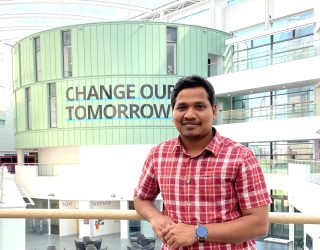Transforming CO2 into sustainable aviation fuels for a net zero future
- Like
- Digg
- Del
- Tumblr
- VKontakte
- Buffer
- Love This
- Odnoklassniki
- Meneame
- Blogger
- Amazon
- Yahoo Mail
- Gmail
- AOL
- Newsvine
- HackerNews
- Evernote
- MySpace
- Mail.ru
- Viadeo
- Line
- Comments
- Yummly
- SMS
- Viber
- Telegram
- Subscribe
- Skype
- Facebook Messenger
- Kakao
- LiveJournal
- Yammer
- Edgar
- Fintel
- Mix
- Instapaper
- Copy Link
Posted: 24 October 2024 | Dr Vinoth Ramalingam | No comments yet
Dr Vinoth Ramalingam, Chancellor’s Fellow in the School of Computing, Engineering and Technology at Robert Gordon University (RGU) offers an insight into the potential of innovative catalyst materials for energy conversion technologies.


Air travel connects people around the world, but it also has a big impact on our planet. Right now, the aviation industry is responsible for about 3% of global carbon dioxide (CO2) emissions over a billion tons every year. As we work to combat climate change, finding cleaner alternatives to traditional jet fuel is crucial.
One promising solution is sustainable aviation fuel (SAF), produced from renewable resources or waste materials with low carbon emissions. SAF has the potential to reduce CO2 emissions by up to 80% compared to conventional jet fuels, making it a crucial component in the UK’s strategy to achieve net zero aviation by 2050.
Advancements in SAF technology, especially with CO2-derived fuel using renewable solar energy, mark a significant leap forward for the aviation industry”
We are excited about the King’s Speech on 17 July that a bill will be introduced to support sustainable aviation fuel production. Following this, a new legislative bill was announced on 22 July to support the UK’s sustainable aviation fuel, which is a key part of the broader strategy to decarbonise air travel. This initiative underscores the urgent need for a transition to SAF and highlights the UK’s commitment to advancing its production.
The UK SAF mandate will start in 2025 at 2% of total UK jet fuel demand, increase on a linear basis to 10% in 2030 and then to 22% in 2040. From 2040, the obligation will remain at 22% until there is greater certainty regarding SAF supply.
The mandate will encourage the innovation of advanced fuels that can generate greater emission reductions and the diversification of feedstocks to reduce dependencies on scarce resources, by including in the mandate:
- A cap on the feedstocks used in the hydro processed esters and fatty acids (HEFA) process, but not until other types of SAF are also commercially viable to recognise the important part that HEFA SAF will play in the 2020s. HEFA supply will not be limited under the mandate for the first two years, fall to 71% in 2030 and still contribute 35% in 2040
- A separate obligation on power to liquid fuels from 2028 that reaches 3.5% of total jet fuel demand in 2040.
Vinoth Ramalingam, a Chancellor’s Fellow and Sustainable Energy scientist at RGU’s School of Computing, Engineering and Technology is at the forefront of this innovative field. Ramalingam’s research focuses on the development of innovative catalyst materials for energy conversion technologies such as green hydrogen production from water electrolysis, ammonia synthesis from nitrogen, and valuable chemical feedstocks and fuels production from CO2.
Currently, his research team at RGU are working on solar powered electrochemical technology that can turn CO2 from the atmosphere into value added chemicals feedstock and fuels including SAF using just sunlight and water in the presence of catalyst materials. More specifically, his team is developing a solar energy conversion device, low cost and innovative catalyst materials made up of tiny metal particles. These tiny catalysts with energy conversion devices will allow us to convert CO2, water and sunlight into SAF. This pioneering approach not only produces valuable SAF, but has the potential to revolutionise the aviation sector by significantly reducing its carbon footprint.
Advancements in SAF technology, especially with CO2-derived fuel using renewable solar energy, mark a significant leap forward for the aviation industry. As these innovations evolve and expand, they pave the way for a future where air travel and environmental sustainability coexist seamlessly.
About the author
Dr Vinoth Ramalingam is a solution oriented and interdisciplinary researcher working on sustainable energy technologies to support low carbon future targets. He earned his PhD in Physics from SRM Institute of Science and Technology, India, in 2017. Following this, he worked as a Postdoctoral Fellow at KAUST and Energy for Future (E4F) Fellow at the University of Strathclyde. He joined RGU in October 2023 as a Chancellor’s Fellow in the School of Computing, Engineering and Technology, where he will build an independent academic career and interdisciplinary research focused on next generation catalysts and solar-driven systems that can efficiently produce valuable fuels and chemicals from abundant sources.
Related topics
Airlines, Airport Carbon Accreditation (ACA), Cleaner, Greener Airports: Making Aviation More Sustainable Series, Emissions, Green energy, Innovation, Regulation and Legislation, Sustainability, Sustainable Aviation Fuel (SAF)



















